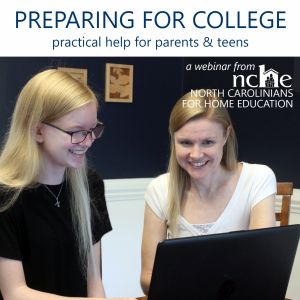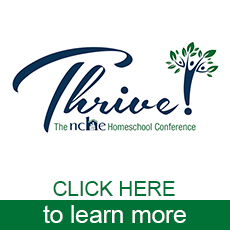
Thank You for Homeschooling and Supporting NCHE!
Christmas Enrichment
 by Sarah Hicks
by Sarah Hicks
Thanksgiving has come and gone, but there are still so many things for which to be thankful! One of those things is DECEMBER! December if often an abbreviated month for textbook school work as parents and children incorporate enrichment opportunities and family traditions into their learning cycles. This is the month that many families put up trees, light candles, serve others, make donations, decorate, bake, drive through light shows, attend recitals or seasonal plays, and get crafty! To find seasonal enrichment ideas for your homeschool, follow us on Pinterest!
We are thankful for our members! Are you a new NCHE member or thinking of becoming a member? Start here.
Three Things You Are Doing that Crush Learning
 Learning is a discovery, an experience, and a marvelous, creative journey (or at least, it can be!) But sometimes learning is also messy, slow, loud, scattered, spontaneous, and completely unorthodox. This can leave parents feeling frustrated that learning is taking too long or wondering if their kids are really learning anything. But could parental haste actually be hindering learning? Judge for yourself as we take a look at three things that are counterproductive to learning.
Learning is a discovery, an experience, and a marvelous, creative journey (or at least, it can be!) But sometimes learning is also messy, slow, loud, scattered, spontaneous, and completely unorthodox. This can leave parents feeling frustrated that learning is taking too long or wondering if their kids are really learning anything. But could parental haste actually be hindering learning? Judge for yourself as we take a look at three things that are counterproductive to learning.
Rushing Being in a hurry is the enemy of learning because learning takes time—it’s that simple! Sometimes we are in a hurry because we are impatient. Sometimes we are in a hurry because we have not given ourselves (as parents and teachers) enough margins to be still and wait for our children. Many times, we are in a hurry because we are overcommitted. Taking a look at the calendar, together as a family, is an opportunity for parents to help their children learn about time management. An empty calendar doesn’t always indicate an absence of learning; sometimes it means that you are making more time for discovery!
Sitting Although busyness is a deterrent to learning, spending most of the day sitting indoors doing copy work is not the most effective way to learn every subject. For many kids, sitting still for long stretches of time crushes learning. There are several alternative options! The first is games. Bringing a hands-on approach to learning is a great way to learn critical thinking skills. Another option is to go outside and explore your big back yard. Build a fort, search for constellations, or make treats for birds and keep a log of all the ones who come to visit. Playing games helps children learn, and it also helps create a love of learning. Once you have made time on the family calendar, be diligent to avoid time-wasters like constantly checking social media, texts, and email (again!)
Talking There’s a difference between talking and teaching. Telling your children how to do everything and correcting every misstep crush learning. Instead of lecturing, consider asking your children questions like:
- Who can tell me what we learned yesterday?
- Today we’re going to learn about this lady. Look at her clothes. Where do you think she lived? When do you think she lived? What makes you think that? What else was happening in the world when she lived?
- Ants are getting into the hummingbird feeder. How could we solve this problem?
And then listen to your children wonder about their world. Wondering is good! Thinking about things in a new light is how discoveries are made. Talking is one of the ways that many children process their world, and listening to your children is one of the ways that we show them that we care about them. It shows them that their thoughts are valuable, and it helps instill confidence. But listening takes time. Are you seeing the pattern?
When parents slow down, there is time for learning– learning about reading, writing, and arithmetic, and also learning about one another. Meaningful family conversations are one of the greatest parts of a home education! Slow down, and enjoy the journey!
We are thankful for our members! Are you a new NCHE member or thinking of becoming a member? Start here.
We Help Parents Homeschool with Confidence and Joy!
I would like to share with you this fantastic video of parents telling how North Carolinians for Home Education has helped them homeschool with confidence and joy!
Our culture is telling you that you don’t have what it takes to homeschool your kids. While deep down, we don’t believe this, sometimes we wonder if it is true. Most parents struggle with those nagging questions, “Do I really know how to do this?” “Am I doing it right?” “Am I going to ruin my kids?”
North Carolinians for Home Education believes that you as the parent are best equipped to raise and educate your children. But we all need accurate information and regular encouragement. Our mission is to equip you with information and encouragement so that you can homeschool with confidence and joy! How do we do this?
- We host Thrive! The NCHE Homeschool Conference every year, which boasts knowledgeable speakers, a huge vendor hall, fun teen activities, an engaging children’s program, a talent showcase, college fair, mentoring, and much more!
- We maintain an informative, up-to-date website that has all the information you need about legislative updates, homeschool helps, an encouraging blog, and much more!
- Our Weekly Homeschool News Email
- Summit Conference for Teaching Exceptional Children
- Moms’ Retreat
- Informative Webinars
- Listings of Homeschool Groups in Your Area
- Regional Liaisons Available to Help Families and Groups
- State-Wide Field Trips
- Extensive Sports League
- Facebook Groups
- Office staff available to answer your questions by phone.
Do you believe in our mission to help parents homeschool with confidence and joy? Have you benefited from our work? If so, please become a member of North Carolinians for Home Education today.
They Want to Take Away Your Right to Homeschool
 We are part of a powerful, growing state and national homeschooling movement. And that was even before the coronavirus! Now more families than ever are homeschooling and benefiting from this life changing choice.
We are part of a powerful, growing state and national homeschooling movement. And that was even before the coronavirus! Now more families than ever are homeschooling and benefiting from this life changing choice.
Unfortunately, that means that those who oppose homeschooling and desire severe restrictions will be working even harder to come against this movement. For example, you probably heard about the Harvard professor who is arguing that homeschooling should be banned and the summit at Harvard that was scheduled (and canceled due to the coronavirus) to discuss what steps the government needs to take to protect homeschool children.
Although the fight might get tougher, North Carolinians for Home Education is up for the task. In fact we have been fighting to protect your freedom to homeschool in NC for over 35 years. This is why I’m asking you to become a member of North Carolinians for Home Education (NCHE). When you join, you enable us to continue our work to protect your right to homeschool in NC. Here are some of the many ways that we have worked to protect your freedoms:
- 1987 – NCHE lobbied against companion homeschool bills HB 837 and SB 779, which would have required families to receive approval from a local school board to begin homeschooling, submit to annual progress reviews by the local school board, and provide instruction 5 ½ hours per day for 180 days per year. They also would have required homeschool teachers to have an associate degree to teach grades 1-8 and a bachelor’s degree to teach grades 9-12.
- 1988 – NCHE authored a substitute for House Bill 837. In order to get our bill passed, the requirement for a high school diploma and annual testing were added to our bill. It was ratified and became law. This is the current homeschool law with the exception of the change made in 2013.
- 1997 – NCHE successfully lobbied against a bill that would require a homeschool student’s transcripts to be approved by a local school district before a driver’s license would be issued.
- 1999 – NCHE successfully opposed House Bill 639, Grandparents Visitation Act, that would have eroded parental authority.
- 2005 – NCHE launched a massive lobbying campaign that succeeded in opposing Governor Easley’s proposal to put the NC Division of Non-Public Education under the authority of the NC Department of Public Instruction.
- 2005 – NCHE successfully lobbied against companion homeschool bills HB 779 and SB 439 that would have raised the compulsory school attendance age to 18.
- 2010 – Working with the Parental Rights Organization, NCHE lobbied against the ratifying of the UN Convention on the Rights of the Child in the US Senate. This treaty would override the US Constitution and all state and local laws, and give control of how children are treated to an unelected UN committee.
- 2013 – NCHE worked to author a new legal definition for “home school” to make participation in co-ops and other instruction outside the home clearly legal. NCHE authored companion bills SB 189 and HB 230, lined up bill sponsors, and lobbied for passage of the bills. House Bill 230 was signed into law by Governor McCrory.
This year we responded to the Harvard professor’s article and the Harvard summit with two blog posts: NCHE Responds to the Harvard Summit and The War on Home Education. We also took decisive action when companion bills were introduced in the house and senate of the NC General Assembly that would have increased reporting for homeschool families and identification of military homeschool families. We communicated with the bill’s authors, mobilized the homeschool community to contact their senators and representatives, and we spoke on your behalf in Raleigh when the committee met for discussion. As a result, the senate bill failed in committee and all references to homeschool were removed from the house bill. You can read more about this in the blog post, What NCHE Is Doing to Keep NC Homeschool Friendly.
Do you want us to continue the fight to protect our freedom to homeschool in NC? Then please support our effort by becoming a member of North Carolinians for Home Education today!
Cultivating Gratitude This Thanksgiving
 This year has truly been unlike any other year we have ever faced. It is likely that many people around you have expressed that they are feeling worn-out, uncertain, or stressed. Perhaps you have even had these thoughts. As the holidays are approaching, now is a great time to intentionally develop a habit of thankfulness. Here are three techniques that your family can use to cultivate gratitude this thanksgiving.
This year has truly been unlike any other year we have ever faced. It is likely that many people around you have expressed that they are feeling worn-out, uncertain, or stressed. Perhaps you have even had these thoughts. As the holidays are approaching, now is a great time to intentionally develop a habit of thankfulness. Here are three techniques that your family can use to cultivate gratitude this thanksgiving.
Make a List Counting your blessings is more than just a good idea, it has proven to help many people lift their spirits. When you take a moment to be still and reflect on all that you have today and all you have had in the past, it can make it easier to have hope for the future. If you look back to the past only to recall hard times, you may still find encouragement knowing that even though you have been hard pressed before, those difficulties helped mold you into becoming an overcomer. Sharing stories of how you have overcome adversity in the past can bring comfort and reassurance to others (and yourself.)
Application: As a family, try writing down on a little slip of paper one thing each day for which you are grateful. Place the papers in a jar. On Thanksgiving, read them out loud. See how many overlap. See if you can guess whose is whose. You may find that your children are grateful for simple things that you have come to take for granted.
Serve Others Serving others helps move our focus from ourselves and our present circumstances toward others and the bigger world in which we live. It is amazing how spending time serving others (something that sounds selfless) is actually something that personally fortifies and enriches your own life—but it does! When we spend time with others, we open the door to seeing how much we have in common with them, we give others an opportunity to whisper hope into our lives, and we give ourselves a chance to bring good news into the lives of others.
Application: Directly interacting with others may be limited this year, but that doesn’t mean that there are not opportunities to serve. From packing an Operation Christmas Child shoe box to sending Christmas cards to shut-ins or buying groceries for families in need through your community grocery store, there are still plenty of safe ways to serve others this holiday season.
Let It Go For most of us, Christmas means a huge influx of toys, clothes, gadgets, gizmos, and—stuff! That makes the weeks leading up to Christmas a great time to clean out from your home things you have outgrown or no longer need. Your gently used clothing and household items may be a real blessing to those in need this year.
Application: As a family, go from room to room in your home, cleaning and gathering items you could share with others. Many donation centers are beginning to accept donations on a limited basis, so call ahead before you go.
We are thankful for our members! Are you a new NCHE member or thinking of becoming a member? Start here.
How to Prepare for College
Sometimes parts of homeschooling feel really overwhelming! This is especially true for some during the high school years and preparing for college. But we believe you can do it and we are here to help! I want to point you to a few fantastic resources that will give you what you need to prepare your homeschool student for college.
First, you’ll want to watch the recording of a super informative webinar we did yesterday. Go here to sign up to get free access to the recording. Here are the topics that cover in the webinar.
 What to Do Throughout High School
What to Do Throughout High School
• How to determine what courses to take
• What to look for in outside activities
• Dual enrollment
• Tests to know about
• Record keeping
Getting into College
• Researching colleges and determining what to look for
• Applying to colleges
• Transcripts
• Financial aid
Be sure also to visit the Homeschooling High School section on our website.
We have compiled some of the best sessions from our Thrive! Homeschool Conference on this topic as well.
- LeAnn Gregory
- Beth Crossmon, The College Decision: Why It Is Important and the One Key Factor You Want to Take into Consideration
- Robert Nelson, Preparing for College in a Changing Secular Environment
- Grayson Marshall, How to Go to College Debt-Free
When you are equipped with the information and encouragement you need, you can homeschool with confidence and joy!
Five Types of Mentors You Should Have

Image courtesy homeschool student SJH
Do you have a mentor? Homeschool mentors are people who believe in home education. They believe in your ability to teach your children. When you need them, a good mentor will provide you with encouragement, practical advice, wisdom, or, let’s face it: a reality check! Here are five different types of homeschool mentors that every homeschool parent needs.
The Celebrity The celebrity mentor is someone you will probably never know personally—although some homeschool figures are surprisingly approachable! Maybe you follow them on social media, or perhaps you have read their books. The celebrity mentors’ names are almost synonymous with homeschooling. These mentors are often highly motivating. They are great because they have websites or blogs that are so transparent that you feel like you’re learning from a friend, but the intimidation factor of speaking with someone face-to-face about a dilemma, deficiency, or fear is eliminated.
The Local The local mentors are homeschool parents in your area who have been around the block. They know who to call for drivers ed, which programs are being offered at your library, and how to do things in your hometown. These mentors are people that you can call when you need information. The best place to find locals is at a homeschool support group. NCHE knows the indispensable value of local support groups, so we continually update this page on our website where you can always find homeschool support groups in your region.
The Sage Sages are homeschool parents who have been homeschooling for so long, that they embody the homeschool lifestyle. They may have graduated a student or two, or maybe their kids are just a few years older than yours. They are people that you look up to, to whom you can relate, and to whom you can go to ask for advice. On hard days, they’re the ones who can lift your spirits with a pearl of wisdom, or the ones who put things in perspective when you are making a mountain out of a molehill.
Sages may be found in local support groups or online support groups. They help you understand about homeschool issues like mixed dominance in children with poor handwriting or connecting to auditory learners when you are a visual/kinesthetic teacher. But they can also help you learn about other areas of the homeschool lifestyle, like the importance of spending time with your spouse throughout the homeschool years, how to take great candid photos of your children, or how to make the perfect buttercream cupcake frosting! Sage mentors usually embody how we envision ourselves in the future.
The Chums This one is pretty straight forward, right? Your chums are your buddies, your friends, and your homeschool mom squad (or dad force.) These mentors are your peers, and they are mentoring you in real time. The reality of what you are facing is not lost on them because you are in the same boat! Chums are important, often overlooked mentors because we usually only think of mentors as people who are farther down the road than we are. But “farther” doesn’t have to mean a decade; it could just be a few weeks! There is a real camaraderie that is built when you have parallel lives with other homeschool parents and you can take turns speaking hope and truth into one another’s lives monthly, weekly, or even daily! My chums are some of the deepest, most important friendships of my whole life.
The Vets Let’s face it, there really isn’t such a thing as a professional homeschooling parent, but there are homeschool veterans who have been homeschooling since the dawn of the modern homeschooling movement. These mentors are older homeschool parents who, no matter what you toss at them, have seen it all. One of the greatest things about North Carolinians for Home Education is how many veteran homeschool parents are available to mentor you—through the wisdom they share in their articles in GREENHOUSE magazine, through their service leading on our board, and 1:1 at the annual NCHE Thrive! Home Educators Conference.
Veteran homeschoolers often have a wealth of wisdom to share and a unique perspective about homeschool accomplishments and homeschool hardships. They are gems in our community, and we are grateful for the insight and optimism that they bring. Helping you find a mentor is part of our mission to help connect you with other homeschoolers and one of the ways that we help you homeschool with confidence and joy.
Consider signing up to be a mentor at the 2021 Thrive! Conference. Registration to be a mentor opens later this month! And if you have questions for our mentors, the Thrive! Conference offers 1:1 mentoring as a great opportunity. Are you a new NCHE member or thinking of becoming a member? Start here.
Helping Your Children Find Their Strengths
Some students seem to enjoy and succeed at school more than others. The good news is that this does not mean that your students who do not enjoy school are not smart. They are just smart in different ways. This is the liberating and empowering premise of Dr. Kathy Koch’s book, The 8 Great Smarts: Discover and Nurture Your Child’s Intelligences. The types of intelligences that normally contribute to strong academics are related to being good with words and logic. Could your child be one of these other smarts?
The 8 Great Smarts
- Logic
- Word
- Nature
- Music
- Picture
- Body
- People
- Self
I had a wonderful conversation with Dr. Kathy about how parents can help their children discover their God given strengths so they can establish an identity and future in accordance with God’s design. In this video you will also learn how our culture often over emphasizes the importance of academics and discover which smarts are important for success in the real world. You can discover and nurture your child’s intelligence, as well as helping them to grow in areas of weakness.
Three Books for Teaching Manners

Image Courtesy: Homeschool Student Elise Frierson
Let’s face it: we’ve all been cooped up for the past few months. Now that we are beginning to return to normal activities, does it seem like your children have forgotten how to behave around other human beings? Fear not! We are here for you! Here are three helpful books that are great for family read-aloud, civics enrichment, or conversation starters at the dinner table.
The Berenstain Bears Forget their Manners by Stan and Jan Berenstain is a lighthearted book for kids who are age eight and younger. This is an older title, and it’s probably available at most public libraries. Topics addressed include name calling, crude behavior, and basic table manners.
Social Rules for Kids—the Top 100 Social Rules Kids Need to Succeed by Susan Diamond makes a superb addition to social studies class for older elementary and middle-school aged children. Each lesson contains well-written examples and practical insight that gets to the heart of being considerate to other people.
George Washington’s Rules of Civility & Decent Behavior in Company and Conversation by America’s first president: George Washington. This book contains 110 timeless reminders for how to behave around others. Although it is a short read (36 pages) the wording is somewhat antiquated and likely better suited for ages 14 and up. (Psssst! Parents might appreciate this book too!)
How are you helping your children adjust to closings, social distancing, and other differences this school year? Share your ideas with other homeschoolers in the comment section below.



